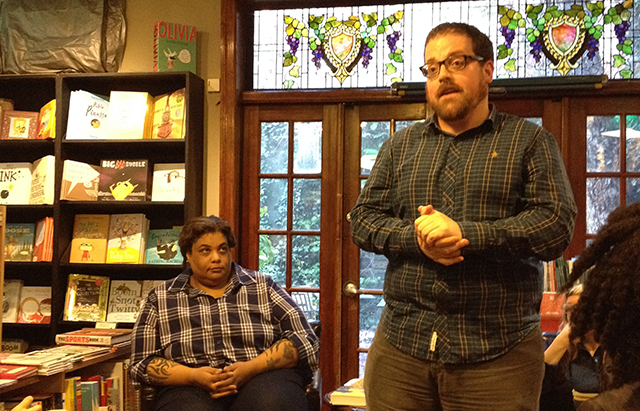
Roxane Gay’s debut novel, An Untamed State (May 2014) has garnered widespread praise. Essays editor at The Rumpus and a publisher/editor of [PANK], Gay is a prolific author with an essay collection on feminism due in August and a memoir relating to hunger and body image in 2016. Volume 1 Brooklyn hosted Gay at Community Bookstore to discuss her new novel with The Rumpus columnist Sari Botton.
Botton has just met Gay for the first time, though they have known each other by email for some time and two of Gay’s essays have been included in collections Botton edited. The first thing Botton wants to know is how Gay has the time to write as prolifically as she does.
“I write fast. I love writing,” Gay says before adding, “I live in the middle of nowhere.” She also says she is an insomniac who wants to make that time productive.

Botton jokes that she finds herself writing essays and before she has finished writing it out longhand, Gay has already published something on Salon on the topic.
“By the time something happens, I’m probably already thinking about the precursors,” Gay says.
An Untamed State took Gay a summer to finish. She says she put the book through two revisions, totalling about four months. She enjoys working on multiple projects at once.
The novel follows the story of Mireille, a Haitian woman kidnapped while on vacation on the island with her white, American husband and their nine month old child. Brutal violence and the huge disparity in wealth dominate the novel’s themes. Mireille’s Haitian family lives a comfortable life on the Island. She leaves for an American education and American husband where they live an upper middle-class lifestyle.
“I knew from the beginning I wanted to tell the story,” Gay says. She wrote a lot about Mireille’s Haitian family and their middle-class lifestyle–material that eventually she came to refer to simply as “pre-writing,” the backstory to the novel.
Gay says she reads a lot of thrillers. Thrillers all start by explaining what happens and leading the reader through the story with that knowledge. The thrill comes from experiencing the trauma of the narrator.
The violence and brutality all came from Gay’s imagination. She says she didn’t read any kidnapping stories before writing the book. “I didn’t want to co-opt their stories.” After she wrote the draft, she researched some details regarding the injuries, but otherwise the violence and kidnapping are all invented fiction.
Privilege, power, and the blind spots that come with privilege are all themes in the novel Botton says. At one point, Mireille believes she will appeal to her kidnappers by reiterating that they took her in front of her child. The response from them though is that children in Haiti face that kind of trauma all the time.
Gay’s parents are Haitian, and as a child they would bring her to the island. When she was younger, it was easy for her parents to hide the poverty from her. As she grew older, it became more difficult. That wealthy disparity helps explain though not justify the kidnappers she says.
“No one is all good or all evil,” Gay says. The kidnappers have a humanity that is necessary for the narrative to hold up.
The novel has a strong relationship with class and with violence against women, though Gay says its a natural progression of the story that they came together. “I’m not an agenda writer.”
Gay’s editors had her pare down the brutal violence at points. She explains that the reader needs a break, a pause in that brutality. One solution was making Mireille a breastfeeding mother. It heightened her suffering to have swollen breasts but wasn’t brutally violent. It also created a connection to other people, her child, her husband.
Still, Gay says she wanted to weave hope into the narrative. Mireille’s mother-in-law, a Nebraskan farmer, grew up surrounded by racism. “I think people do grow,” Gay says. Family is complicated. “I wanted there to be this arc of hope.”
Nebraska and Haiti both play a big role in the novel, and both are important parts of Gay’s past. She chose the settings because they were places she knew adding to the authenticity of the things she didn’t.
At first she thought all she wanted to do was leave Nebraska, but now she wants to go back. She says Nebraskan boys are beefy, a quality she likes: “I’m super controlling… I need that solidness.”
Botton asks about Gay’s essay writing–and what her parents think since many of the essays offer deeply personal insights. Botton cites specifically an essay on body image in XO Jane about body image.
“When I write, I delude myself into thinking no one will read it,” Gay says. She says she has compartmentalized her life, and though her parents know she writes, she has a sense they don’t read very much of what she has written. She hopes. “They know about this book because my brother has a big ass mouth,” she says. But her parents are also beginning to Google.
“I’m very happy my parents don’t know how to Google,” Botton adds.
Gay says her one brother works in business and doesn’t pay attention to the things she writes, but her youngest brother stalks her Facebook. He gets around her filters. “We’re a passive aggressive family,” she says, adding that is the Catholic and the Haitian tradition to not ever confront anyone about issues like that.
Besides the novel and writing many essays, Gay is also prolific on social media like Twitter. “I’m shy, but on Twitter I feel I can say whatever the fuck I want,” she says, adding that she has real friends too. But she says her preference is still fiction. “I’m a pretty mellow person,” she says, and fiction allows her be more wild. She has three more novels on the way.